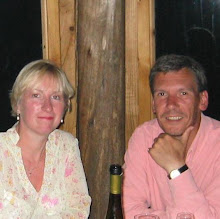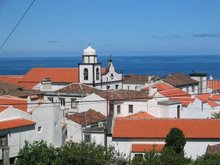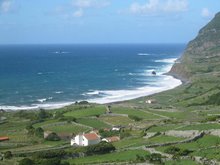On the way back up from getting the bread at Joe & Linda's recently, I was hailed by José Augusto, the vice-president of the junta de freguesia (parish council) of Faja Grande. He hoped that the works to the chafariz were not causing us any problems.
JA's enquiry was in Portuguese (not unreasonably) and I felt quite chuffed with myself that I managed to get the "I hope that the works to" and the "are not causing any problems" bits. But the key word which linked these two concepts - chafariz - eluded me totally. I was left looking at JA blankly thinking "It's nice of you to ask but I haven't a fucking clue what you're talking about, mate ..."
JA for his part was far too polite to express his utter contempt for this Gringo fuckwit who has lived in his village for the thick end of seven years and STILL doesn't know what a chafariz is. For a few ghastly moments I thought he might have been contemplating the indignity of being reduced to doing some sort of charade to demonstrate what a chafariz is. But he wisely refrained and instead the conversation just rather embarrassingly petered out and we went our respective ways with a safe and mutually comprehensible comment about the weather (Ta Bom Tempo!) instead ...
Next day, I asked Linda at the shop (born in California, ergo native English speaker) what a chafariz is. "Oh" she said "it's one of these things! You know! In the street. You know - with the water and all ...!"
The fact is there just isn't an English word for chafariz. As seen in the photos above, it's a public tap, well, fountain - all of these things. Here's the Portuguese Wikipedia entry. It the thing where people went to get water before it was piped into everyone's houses. On Flores, that was much later (1970s (?)) than anywhere in Britain. There are chafarizes on Flores with dates on them in the 1950s (don't have a picture but note to self to make a point of taking one). I can't think of a single chafariz in any town or village that I've seen anywhere in Britain.
I suppose in flat territory (like the Mississippi basin), the equivalent of a chafariz is the village pump - where the water is beneath you and has to be pumped to the surface. Flores, being a hilly kind of a place, though, means the water is generally above you and so flows down to a tap - fawcett as our American cousins would have it. Though, while we're on the subject, the Portuguese word for a tap is torneira - literally, a "turning thing". How apt.
Anyway, this is all a massive digression from highlighting (the Portuguese verb destacar comes to mind - meaning to emphasise, showcase; em destaque means the headlines or top story) the good work being done by the junta de freguesia restoring all the chafarizes around Faja Grande. Everyone's got water piped into their houses now but it's remarkable how often you see the chafarizes still being used by workmen cleaning their tools or just farmers cleaning cow shit off their boots.
The work has been done by a nice young bloke called (better not mention
his name) who is a real craftsman. He's made the little - here's another
example of where I'm not sure if there's an English word but in
Portuguese, I think, it's placas - the bass relief decorations - by himself - i.e. he didn't buy them out of the Portuguese equivalent of Homebase. Nice one.
I think this is money better spent than on museums and sports facilities. Although I may be guilty of sentimentality. Discuss.
But more seriously, I couldn't help wondering how you would do a charade for a chafariz (note the relative paucity of English words just there) if ever called upon: don't scoff - two people in this village have come perilously close in recent weeks. I found myself involuntarily doing a sort of extending my nose out and downwards movement with my left hand and a twirling motion above my head with my right. And with both hands, pulling the bottom of my T-shirt out in a sort of basin/sink forming gesture. This could all get misinterpreted, though. Best confined to the privacy of one's own home and certainly not to be attempted anywhere near the gates of your local primary school.
Subscribe to:
Post Comments (Atom)









8 comments:
The word "Chafariz" is one of our Portuguese words of arab origin. Quite nice, this work on the fountains.
Best wishes,
Thanks Luis - I guessed that chafariz might be an Arabic origin word.
It would be interesting to know what they call a chafariz in Cairo or Baghdad.
Luís I must disagree with you. Nice? To destroy/cover old stone (cantaria) and substitute it with "sawed stone" (pedra serrada)..... don't think so. In Fajã, as Maria Antónia Fraga says, they are transforming the Beauty into cute, "muito arranjadinho", but not natural and genuin. You should watch the latest tv show Em Foco from RTP - Açores and listen to Serge Viallelle from Espaço Thalassa: "no alcatron, no cement, no bloques", just leave it as it was, preserve.
http://janeladeguilhotina.blogspot.pt/
A nice text from Maria Antónia Fraga, about pedra serrada(Neil she is descendent from florentinos, the street of Fontinha has is uncle name: Padre Luís de Fraga).
Marisa, are these Fragas you mention from Fajã Grande, specifically Ponta? I've discovered that Fraga is a family name on my father's maternal grandmother's side, from there!
No Kathie, they are from Fajã Grande.
I suspect that, historically, folks from Fajã Grande and Ponta da Fajã Grande were able to travel the relatively short distance between the two nearby places in order to meet, court, perhaps marry, and in any event mate :-)))
My parents and I are on Flores! We went to our great grandparents hometown at Fajazhina and then to Faja Grande! I've followed your blog for a long time.
It was fun to see some of the sights.
Wish I knew where Linda's store was because it would have been nice to talk with someone in English. Was also hoping to see you walking around....Kim
Post a Comment